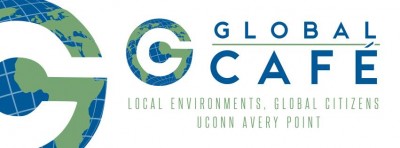The Avery Point Global Cafe hosts lunchtime panel discussions, films, and symposia. The following dates are scheduled for Fall 2014. These events are geared toward a general student/faculty audience with the intent of exploring a range of topics related to climate change.
- Thursday, Sept. 18th, Film Screening of “DISRUPTION” – Avery Point Auditorium, 12:30pm. Open to the public. FREE
Tuesday, Oct. 14th, Lunchtime Panel Discussion on Climate Change
Avery Point Student Center, 12:30-1:45pm
Open to UCONN faculty, students, and staff. This is the first in a series of lunchtime panel discussions on climate change. Each panelists will speak for 15 minutes followed by a moderated discussion with the audience.
Panel Presentations:
Diagnosing A Wicked, Messy Problem: A Policy Sciences Perspective on Climate Change – Syma A. Ebbin, Ph.D.
This presentation will examine the problem of climate change from the perspective of the policy sciences. Dr. Ebbin will examine characteristics that make this a wicked, messy problem and take a close look at how the problem of climate change has been defined and redefined. She will assess the role that news and social media, powerful stakeholders, political entrepreneurs, and windows of opportunity have played in helping and hindering this problem’s passage onto the policy agenda.
Addressing the Impacts of Climate Change from the Senate to the EPA to the Shoreline of Connecticut – Rebecca French, Ph.D.
Rebecca French is the first Director of Community Engagement for a new Institute at Avery Point, the Connecticut Institute for Resilience and Climate Adaptation (CIRCA). Dr. French will discuss the vision for CIRCA and how a research university can help towns adapt to climate change. She will also talk about her experience in Washington, DC as a science policy fellow from 2011-2014, during which Irene and Sandy hit the northeast and shifted the conversation on climate change in the federal government.
Kalimiut Community Life and Subsistence: Confronting Change on Alaska’s North Slope – Jason R. Mancini, Ph.D.
In this presentation, Dr. Mancini will discuss his recent travels to and work with the Kalimiut of Point Lay, Alaska. Located on Alaska’s remote North Slope, this community of 250 people depend on a variety of marine resources including beluga whale, bearded seal, walrus, fish, and waterfowl. Global climate change, gas and oil exploration and drilling, and the ongoing influx of western consumer goods present significant challenges to community subsistence and lifeways. Mancini will also talk about his planned research and collaboration with Mystic Aquarium and the North Slope Borough (Alaska) Department of Wildlife Management.
Moderator: Greg Stone (Journalism)
Monday, Nov. 17th, Lunchtime Panel Discussion on Climate Change
Avery Point Student Center, 12:30-1:45pm.
Open to UCONN faculty, students, and staff. This is the second in a series of lunchtime panel discussions on climate change. Each panelists will speak for 15 minutes followed by a moderated discussion with the audience.
Panel Presentations:
Extreme Climate Events: The Other Climate Change Problem – Michael Finiguerra, Ph.D.
Global mean temperatures are expected to increase 2-4° by the end of the 21st century with expected far-reaching ecological consequences. Concurrent with these gradual temperate shifts are projected increases in extreme climate events (ECEs), such as droughts, floods and heat waves. Heat waves, loosely defined as prolonged periods of well-above-average temperatures at a locality, in particular, are expected to increase in frequency and duration. Across the northeast US, annual three-day heat wave temperatures may increase by 3-8°C, with the frequency and duration of heat waves projected to increase as well. In this presentation I will go over the expected increase in ECEs, their possible effects on aquatic ecosystems, and the carry over to societal change as well.
Innovation Abilities in Animals and Their Necessity for Survival in a Changing Global Environment – Allison Kaufman
Global climate change directly impacts the environment of many species. In some cases, this change may be drastic enough to cause shortages in food or shelter. Species which cannot adapt to change are not likely to survive. This presentation will discuss innovative abilities and higher cognition in animals, and how these abilities can be a selective advantage in a changing environment.
Lessons on Resiliency from Sri Lanka – Jamie Kleinman, Ph.D.
There has been a sharp increase in the number of severe weather events in the US over the past decade. These events can often lead to stress and a decompensation in functioning and mental health. Some individuals experience Post Traumatic Stress Disorder (PTSD) as a result of these occurrences. While people in other countries often look to the US as a leader in crisis response management and mental health diagnosis and treatment, there are lessons that we can learn as well. I will be discussing the response to the tsunami that occurred in Sri Lanka in 2004 and how it has since shaped our treatment of PTSD here.
- Thursday, Dec. 4th, Film Screening of Years of Living Dangerously, 12:30pm, Avery Point Auditorium. One-hour episode on Hurricane Sandy followed by Q&A with Dr. Frank Bohlen. Open to Avery Point students, faculty and staff.
